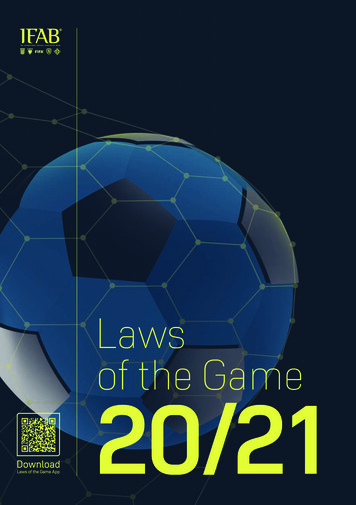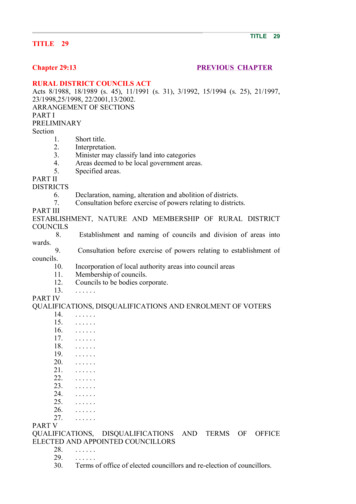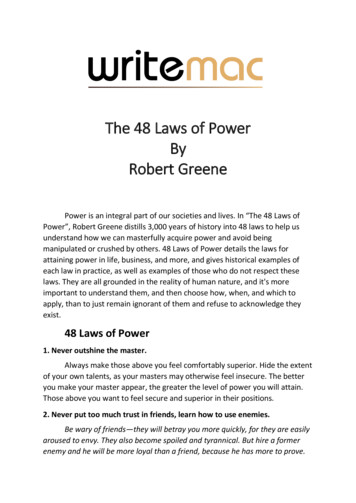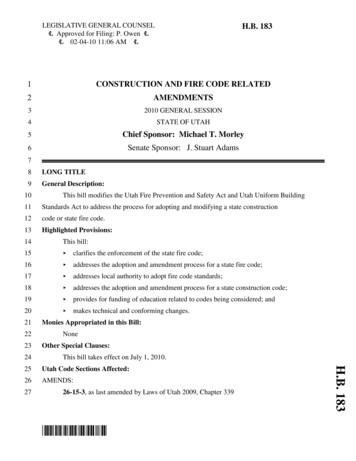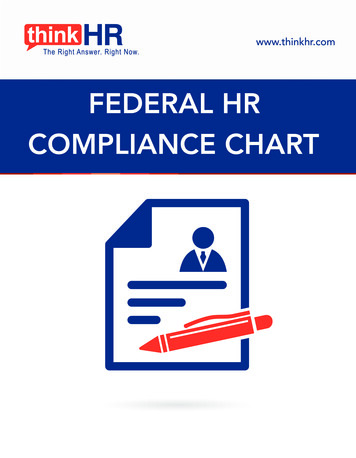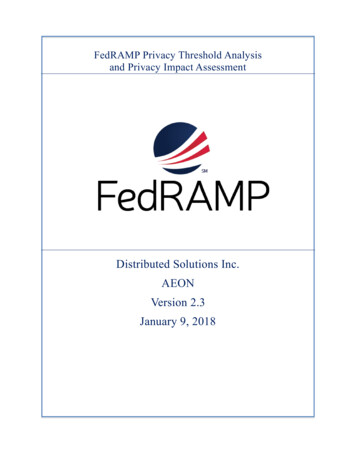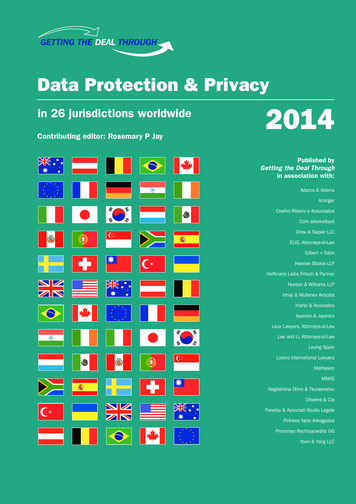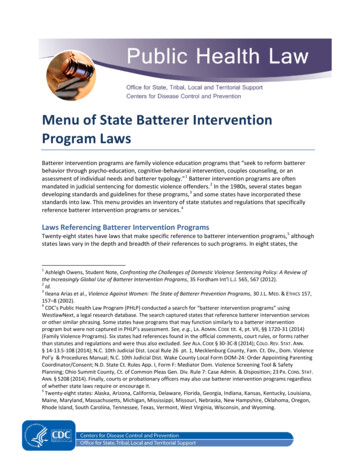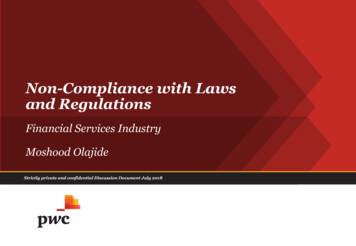
Transcription
Non-Compliance with Lawsand RegulationsFinancial Services IndustryMoshood OlajideStrictly private and confidential Discussion Document July 2018
SynopsisThe International Ethics Standards Board for Accountants (IESBA) hasissued a pronouncement on professional accountants’ Response to NonCompliance with Laws and Regulations (NOCLAR). It sets out a frameworkthat requires professional accountants (PAs) to take actions when theybecome aware of any illegal or potential illegal act.The pronouncement comprises the following:1. Section 225 concerning PAs in public practice;2. Section 360 concerning PAs in business; and3. Consequential and conforming amendments to other sections of theIESBA Code of Ethics for Professional Accountants (the Code).NOCLAR became effective on 15th July 2017.In this session, we will articulate the key requirements, obligations andimpact on professional accountants in practice and those in organisations.2Non-Compliance with Laws and Regulations
Learning outcomeAt the end of this session, participants should be able to: Understand the new pronouncement on NOCLAR Explain the purpose of NOCLAR to all stakeholders Become aware of potential illegal act in organisations Identify key requirements, obligations and impact of NOCLAR onprofessional accountants Know how to respond to NOCLAR under different scenarios Manage the associated risk when responding to NOCLAR3Non-Compliance with Laws and Regulations
Table of ContentsOverview of NOCLAR pronouncementThe scope of NOCLAR pronouncementProposed response frameworkPossible implicationsConclusions and case studyQuestions and answers
Overview of NOCLAR- Context and background- Purpose / objectives
Context and backgroundIn August 2012, the International Ethics Standards Board for Accountants (IESBA)issued an exposure draft (ED) of its proposals, responding to a Suspected Illegal Act.Respondents from the regulatory community, in particular, were supportive of theBoard’s efforts to provide guidance not only to auditors but also to ProfessionalAccountants (PAs) in public practice providing services other than audits of financialstatements, and those in business.As a result of significant concerns across most stakeholder groups regarding theoperability of the proposals, the Board held a series of global roundtables in 2014.The roundtables were able to solicit further views and input from stakeholders on theissues. As a result of the significant comments on the ED, the roundtable input and theBoard’s further deliberations and consultations with other stakeholders, the Boarddeveloped an approach for PAs to respond to instances of Non-Compliance with Lawsand Regulations (NOCLAR) or suspected NOCLAR.6Non-Compliance with Laws and Regulations
Purpose and objectivesIn providing a professional service to a client or carrying out professional activities foran employer, Professional Accountants come across various acts or suspected acts ofnon-compliance with laws and regulations (NOCLAR).The PA has a prima facie ethical responsibility not to turn a blind eye to such matters.At the same time, the IESBA recognised that such a situation can often be a difficultand stressful one.In order to provide a solution to the dilemma, the Board approved the NOCLARpronouncement to develop enhancements to the IESBA Code to help guide the PAs indealing with the situation and in deciding how best to act in the public interest.When responding to non-compliance or suspected non-compliance, the objective ofthe professional accountant should be to comply with fundamental principles ofintegrity and professional behaviours while taking public interest into consideration.In addition, the aim is for the entity to correct the NOCLAR and remediate or preventits occurrence where it is still being suspected.7Non-Compliance with Laws and Regulations
Why the Standard was developedThe standard was developed in response to the following issues/concernsThe duty of confidentiality owed the client which acted as a barrier todisclosing likely NOCLAR to regulators and public authorities.Auditors resigning to avoid NOCLAR issues.No guidance to assist the PA in working out the best response topotential NOCLAR.8Non-Compliance with Laws and Regulations
What the Standard aims to achieveEnhanced ethical conduct: Clarifies the appropriate response of a PA to a potential NOCLAR andemphasises the role of management in addressing in the matter. Increase awareness and understanding of the PA’s legal and regulatoryresponsibilities when faced with a potential NOCLAR situation.Protection for stakeholders and the general public Stimulate PAs to take a proactive role in responding to NOCLAR towardsobtaining an earlier response from management, lower rates of NOCLAR andtimely intervention from regulators.Enhanced role and value of the accountancy profession Enhances the reputation of the profession and enables the profession playagreater role in the fight against significant NOCLARs.9Non-Compliance with Laws and Regulations
DefinitionNon-compliance can be defined as: Any act of omission or commission by the entity, either intentional or unintentional, which arecontrary to the prevailing laws or regulations. Such acts include transactions entered into by, or in the name of, the entity, or on its behalf, bythose charged with governance, management or employees. Non-compliance does not include personal misconduct (unrelated to the business activities of theentity) by those charged with governance, management or employees of the entity.’10Non-Compliance with Laws and Regulations
Scope of NOCLAR- Who is covered?- What is covered?- Scenarios / Examples- Exclusions
Who is covered?The NOCLAR Pronouncement is applicable to all professional accountantsincluding:Professional Accountants inPublic Practice Audit of financial statements Other assurance services Professional services other thanaudit of financial statement e.g. Tax,Accounting, Training etcProfessional Accountants inBusiness Those working as employees fororganisations in various roles Senior PAs in business12Non-Compliance with Laws and Regulations
What is covered?NOCLAR covers: Any acts of non-compliance with laws and regulations the PA encountersor is made aware of Suspected acts of non-compliance with laws and regulations By employees of the organisation, management and those charged withgovernance including third parties under the control of the entity Whether international, or not, by omission or commission.13Non-Compliance with Laws and Regulations
What is covered?Scenarios and examplesExamples include laws and regulations that deal with:Fraud, corruption and briberyMoney laundering, terrorist financing and proceeds of crimeSecurities markets and tradingBanking and other products and servicesData protectionTax and pension liabilities and paymentsEnvironmental protectionPublic health and safety14Non-Compliance with Laws and Regulations
Scope exclusionNOCLAR does not apply to the following although the framework may beapplied in dealing with them: matters that are clearly inconsequential, judged by their nature andimpact, financial or otherwise (disclosure etc). For example: trying tocajole a traffic officer to ignore penalties for a traffic violation. personal misconduct unrelated to the business activities- For example: Atop employee getting drunk or driving under the influence of alcohol. non-compliance other than by the employing organisation or any of itsother stakeholders- For example: Conducting a due diligence on acompany on instructions of another company.15Non-Compliance with Laws and Regulations
The proposed responseframework
Response frameworkPAs in public practiceAudit of financialstatementsWhen a professionalaccountant in public practicebecomes aware of an noncompliance or suspectednon-compliance, thefollowing steps are to betaken.Response1. Become aware(see it, but do not seek it)2. Obtain an understanding of the matter (nature of the actand the circumstances), discuss with management, mayseek legal counsel.3. Addressing the matter (rectify, remediate, mitigate,deter, disclose)4. Communication with respect to groups (for financialstatements audit)5. Determine whether further action is needed (timelyresponse, appropriate steps taken by entity etc, considerwithdrawing from engagement)6. Determine whether to disclose the matter to appropriateauthority7. Documentation- comply with ISA and PwC auditdocumentation17Non-Compliance with Laws and Regulations
Response frameworkPAs in public practiceResponse1. Become aware (see it, but do not seek it)Non-audit services2. Obtain an understanding of the matterWhen a professional accountant inpublic practice becomes aware of annon-compliance or suspected noncompliance, the following steps are tobe taken.3. Address the issue with management andthose charged with governance4. Communicate the matter to the entity’sexternal auditor5. Consider whether further action is needed inthe public interest e.g. disclosing toauthorities or withdrawing from theengagement6. Documentation – the matter, result ofdiscussion with management or thosecharged with governance, actions taken.18Non-Compliance with Laws and Regulations
Response frameworkPAs in businessProfessional Accountantsother than SeniorProfessional AccountantsWhen an organizations haveestablished protocols andprocedures regarding how noncompliance or suspected noncompliance should be raisedinternally. The professionalaccountant is expected to considerthem in determining how tohandle non-compliance.Response1. Subject to established protocols andprocedures, inform an immediate superior toenable the superior to take appropriate action.2. If the PA’s immediate superior appears to beinvolved in the matter, inform the next higherlevel of authority within the organisation.3. In exceptional circumstances, the PA maydecide that disclosure of the matter to anappropriate authority is an appropriate courseof action.4. Documentation – matter, discussion, responseby superior, and decision taken.19Non-Compliance with Laws and Regulations
Response frameworkPAs in businessResponse1. Become aware (see it, but do not seek it)Senior ProfessionalAccountants (SPAs)2. Obtain the understanding of the matterSPAs are directors, officers or senioremployees able to exert significantinfluence over, and make decisionsregarding, the acquisition,deployment and control of human,financial, technological, physical andintangible resources.4. Determine whether further action isneeded3. Address the matter5. Determine whether to disclose thematter to an appropriate authority6. Documentations20Non-Compliance with Laws and Regulations
Possible Implications- Practical considerations- Legal implications- Some examples
Responsibilities of Professional AccountantsWhen a professional accountant becomes aware of information regarding noncompliance or suspected non-compliance, the accountant is expected to obtainunderstanding of the matter, apply professional judgement and expertise, but notexpected to have a level of understanding of laws and regulations beyond that which isrequired of his role with the employing organisation.In exceptional cases, the professional accountant may disclose an act of non-complianceto appropriate authority and such act will not be considered as breach of confidentialitybut an act of good faith in the interest of the public.Factors to consider include:1.2.3.4.5.6.The legal and regulatory frameworkThe urgency of the matterThe pervasiveness of the matter throughout the organisationWhether there is confidence in the integrity of those charged with governanceWhether non-compliance is likely to recurActual or potential harm to the interest of the organisation, investors, creditors,employees or general public.22Non-Compliance with Laws and Regulations
Responsibilities of management and those chargedwith governanceIt is the responsibility of the employing organisation’s management and thosecharged with governance, to ensure that their business activities areconducted in accordance with laws and regulations and to identify any formof non-compliance by any of its stakeholders.Non-compliance may result in fines, litigation, or other consequences for theemploying organisation that may have a material effect on its financialstatement and may also affect negatively investors, creditors, employees orgeneral public.23Non-Compliance with Laws and Regulations
Questions!24Non-Compliance with Laws and Regulations
Thank you!This is a proposal document and does not constitute a contract of engagement with PricewaterhouseCoopers Nigeria. The information set out in it is an indication ofthe terms on which we propose to carry out outsourced internal audit services for you but the proposal is subject to the terms of any subsequent engagement contractthat may be entered in to between us. In the event that our proposal to you is successful, our acceptance of the engagement will be contingent upon the completion of allour internal engagement acceptance procedures. 2018 PricewaterhouseCoopers Nigeria. All rights reserved. In this document, "PwC" refers to the Nigeria member firm, and may sometimes refer to the PwC network.Each member firm is a separate legal entity. Please see www.pwc.com/structure for further details.
Enhanced role and value of the accountancy profession Enhances the reputation of the profession and enables the profession playa greater role in the fight against significant NOCLARs. 9 Non-Compliance with Laws and Regulations. Definition Non-compliance can be defined as:
